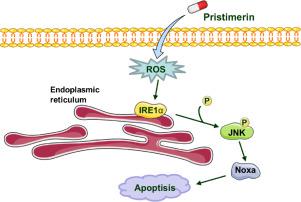Phytomedicine ( IF 6.7 ) Pub Date : 2021-08-19 , DOI: 10.1016/j.phymed.2021.153723 Qun Zhao 1 , Xinran Cheng 2 , Wei Yu 3 , Yun Bi 2 , Jian Guo 2 , Qingzhao Ma 2 , Yingxia Gong 4 , Li He 3 , Xianjun Yu 5

|
Background
Pristimerin (Pri), a natural quinone methide triterpenoid isolated from Celastraceae and Hippocrateaceae, exhibits potent antitumor activity against various cancers. However, the mechanism of apoptosis induction by Pri in oral squamous cell carcinoma (OSCC) and its anti-OSCC effect in vivo has not been widely studied.
Purpose
This study aimed to investigate the anti-OSCC activities of Pri in vitro and in vivo and addressed the potential mechanisms of Pri-induced apoptosis.
Methods
The effects of Pri on OSCC cells were analyzed by cell viability, colony formation and flow cytometry assays. Western blotting and qRT-PCR assays were chosen to detect the expression of proteins and genes. The anti-OSCC efficacy of Pri in vivo was evaluated by CAL-27 xenografts.
Results
We showed that Pri inhibited the proliferation of human OSCC cell lines. Additionally, Pri induced apoptosis by upregulating Noxa expression. Furthermore, Pri treatment triggered excessive endoplasmic reticulum (ER) stress activation and subsequently induced c-Jun N-terminal kinase (JNK) signaling. ROS scavengers and ER stress inhibitors significantly attenuated Pri-induced OSCC cell apoptosis. Finally, Pri suppressed tumor growth in CAL-27 xenografts, accompanied ER stress activation and cell apoptosis.
Conclusion
These results reveal that Pri suppressed tumor growth and triggered cell apoptosis through ER stress activation in OSCC cells and xenografts, suggesting that Pri may serve as a therapeutic agent for OSCC.
中文翻译:

Pristimerin 通过激活 ROS 依赖性 ER 应激/Noxa 通路诱导口腔鳞状细胞癌的细胞凋亡和肿瘤抑制
背景
Pristimerin (Pri) 是一种从 Celastraceae 和 Hippocrateaceae 中分离的天然醌甲基三萜化合物,对各种癌症表现出有效的抗肿瘤活性。然而,Pri 在口腔鳞状细胞癌 (OSCC) 中诱导细胞凋亡的机制及其在体内的抗 OSCC 作用尚未得到广泛研究。
目的
本研究旨在研究 Pri在体外和体内的抗 OSCC 活性,并探讨 Pri 诱导细胞凋亡的潜在机制。
方法
通过细胞活力、集落形成和流式细胞术分析来分析 Pri 对 OSCC 细胞的影响。选择蛋白质印迹和 qRT-PCR 检测来检测蛋白质和基因的表达。Pri在体内的抗 OSCC 功效通过 CAL-27 异种移植物进行评估。
结果
我们发现 Pri 抑制了人 OSCC 细胞系的增殖。此外,Pri 通过上调 Noxa 表达诱导细胞凋亡。此外,Pri 治疗引发了过度的内质网 (ER) 应激激活,随后诱导了 c-Jun N-末端激酶 (JNK) 信号传导。ROS清除剂和ER应激抑制剂显着减弱了Pri诱导的OSCC细胞凋亡。最后,Pri 抑制了 CAL-27 异种移植物中的肿瘤生长,伴随着内质网应激激活和细胞凋亡。
结论
这些结果表明,Pri 通过 OSCC 细胞和异种移植物中的 ER 应激激活抑制肿瘤生长并触发细胞凋亡,表明 Pri 可作为 OSCC 的治疗剂。











































 京公网安备 11010802027423号
京公网安备 11010802027423号